Key takeaways:
- Aggregator reputation is impacted by user-generated content, information accuracy, and community engagement, all of which shape public trust.
- Proactive reputation management, including addressing negative feedback and fostering positive interactions, is essential for customer loyalty and business success.
- Future trends indicate a growing emphasis on transparency, social listening, and community building to enhance brand reputation and customer relationships.
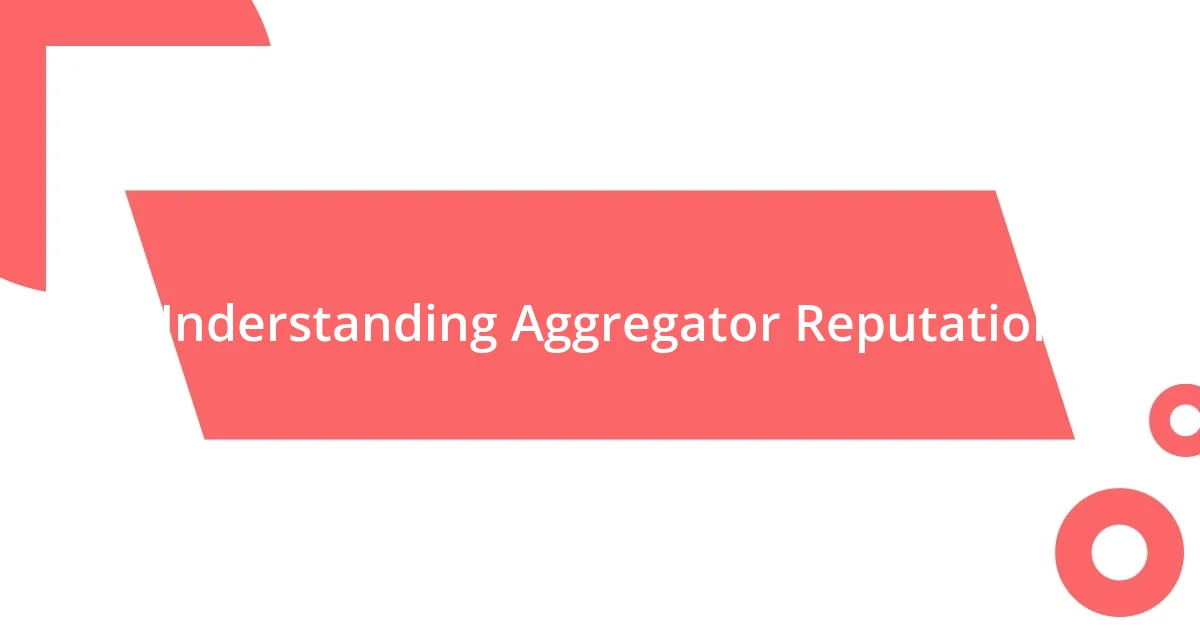
Understanding Aggregator Reputation
Aggregator reputation is crucial in our digital landscape, impacting not only consumer trust but also the overall success of businesses. I remember when I first used an aggregator site to find reviews on a product; the sheer volume of conflicting information left me bewildered. It made me wonder—how can a platform maintain its integrity when users rely on it to dictate their purchasing decisions?
When it comes to aggregator reputation, transparency is vital. I often find myself questioning the authenticity of user ratings and reviews. The personal connection I form with a product’s backstory can sometimes overshadow the numbers I see on the aggregator, leading me to ponder: how much weight should I really give to that star rating?
Trustworthiness shapes the perception of aggregators. I’ve seen firsthand how a single negative review can significantly alter public opinion, prompting a feeling of unease about a product I initially loved. Hasn’t it ever made you reconsider a choice you were ready to make? That’s the power of reputation—one that aggregates and amplifies our collective experiences.
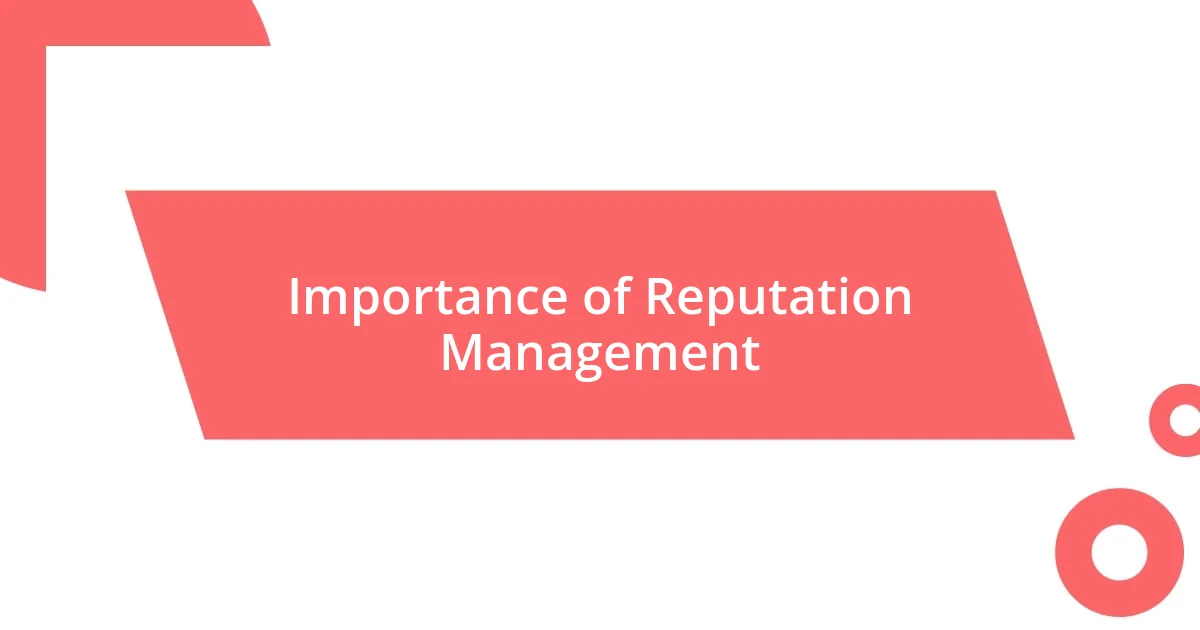
Importance of Reputation Management
Reputation management plays a pivotal role in how businesses and platforms are perceived in today’s digital age. I recall a recent experience when I noticed a small café had amassed a flurry of negative reviews overnight over a service issue. It amazed me how quickly public sentiment shifted, causing me to second-guess my plans to visit. This incident showcased how fragile reputation can be and underscored the necessity for proactive strategies in managing it.
- A positive reputation builds customer loyalty and trust, encouraging repeat business.
- Effective reputation management helps mitigate the impact of negative publicity.
- Strong reputations can lead to better partnerships and collaborations in the industry.
- Monitoring and responding to feedback fosters a sense of community and engagement with customers.
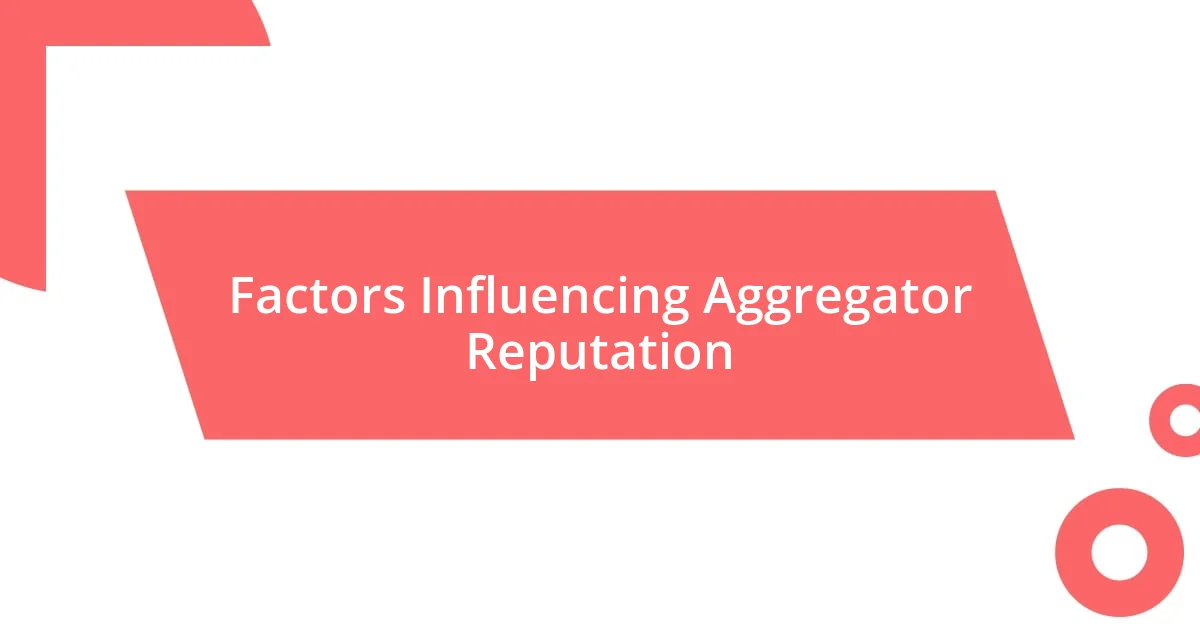
Factors Influencing Aggregator Reputation
There are several key factors that shape the reputation of aggregators. User-generated content, such as reviews and ratings, significantly impacts how these platforms are perceived. I still recall the moment I discovered a restaurant through an aggregator; a single glowing review swayed my decision, while a few critical comments made me hesitate. It strikes me that even a small number of negative ratings can cast doubt, emphasizing the power of public opinion in building or breaking trust.
Another pivotal influence is the accuracy of the information presented. I once relied on an aggregator that boasted a comprehensive list of services for local businesses, only to find outdated or incorrect details. That experience left a lasting impression on me; I questioned not just the platform’s reliability, but also how they maintained their database. This experience illustrated that even minor inaccuracies can damage reputation and lead to a loss of credibility among users.
Finally, engagement with the community is essential for maintaining an aggregator’s reputation. I can think of a specific instance when I interacted with a platform’s customer service after a negative experience from a recommendation. Their responsive approach transformed my dissatisfaction into appreciation, demonstrating firsthand that addressing concerns can turn a potentially damaging scenario into an opportunity for strengthening relationships.
| Factor | Impact on Reputation |
|---|---|
| User-Generated Content | Shapes trust based on reviews; negative comments can deter users. |
| Information Accuracy | Outdated or incorrect data damages credibility. |
| Community Engagement | Proactive responses to user feedback build loyalty. |
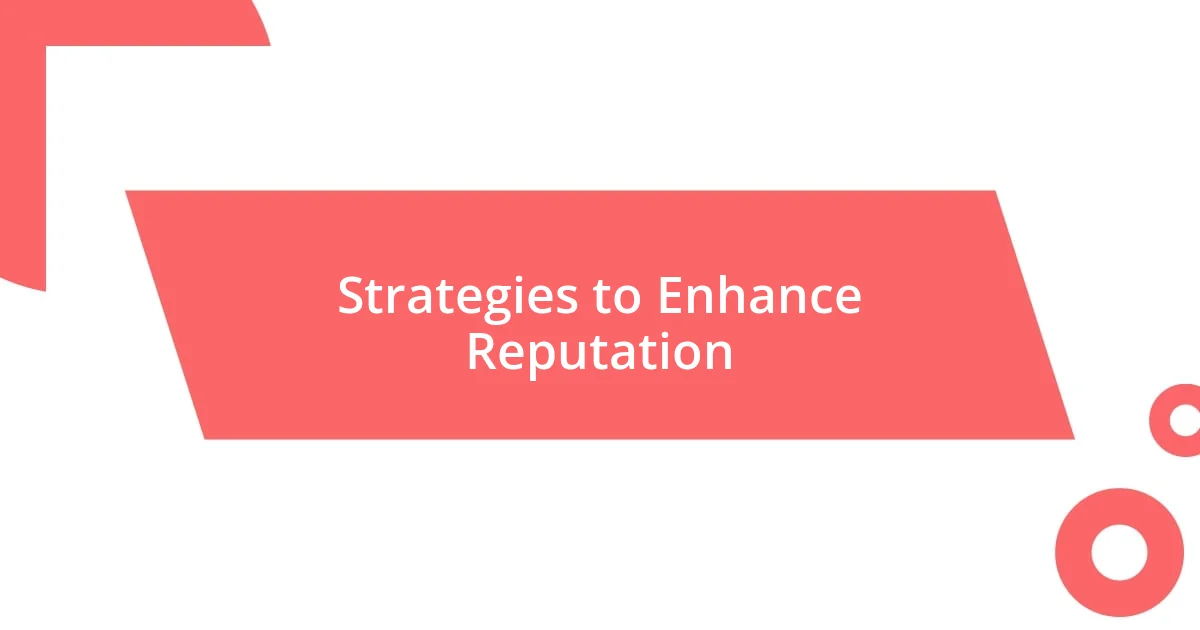
Strategies to Enhance Reputation
To enhance reputation, one effective strategy is to actively solicit and showcase positive reviews. I remember a small business I supported that regularly encouraged its customers to leave feedback online. Seeing those happy stories displayed prominently on their site not only attracted new customers but also reinforced existing ones. Why? Because we all like to know we’re part of a community that values our opinions, and those testimonials have a way of making potential clients feel connected before they even step through the door.
Another approach that resonates well is transparency. I once admired a tech company that openly shared their process for addressing user complaints. They published case studies detailing how they tackled issues raised by customers. This level of honesty made me trust them more. When businesses show that they’re willing to learn and adapt, don’t you think it fosters a deeper sense of loyalty? It’s about creating a narrative that lets customers see the humans behind the brand, ready to improve and engage.
Finally, investing in community initiatives can significantly bolster reputation. I once saw a local café host a charity drive, bringing together patrons for a good cause. Their selfless act not only elevated their standing in the community but also drew in curious new visitors. When organizations contribute positively to society, it reflects values that many customers hold dear, and who wouldn’t want to support a business that gives back? Engaging with the community in this way not only enhances reputation but also creates lasting emotional connections.
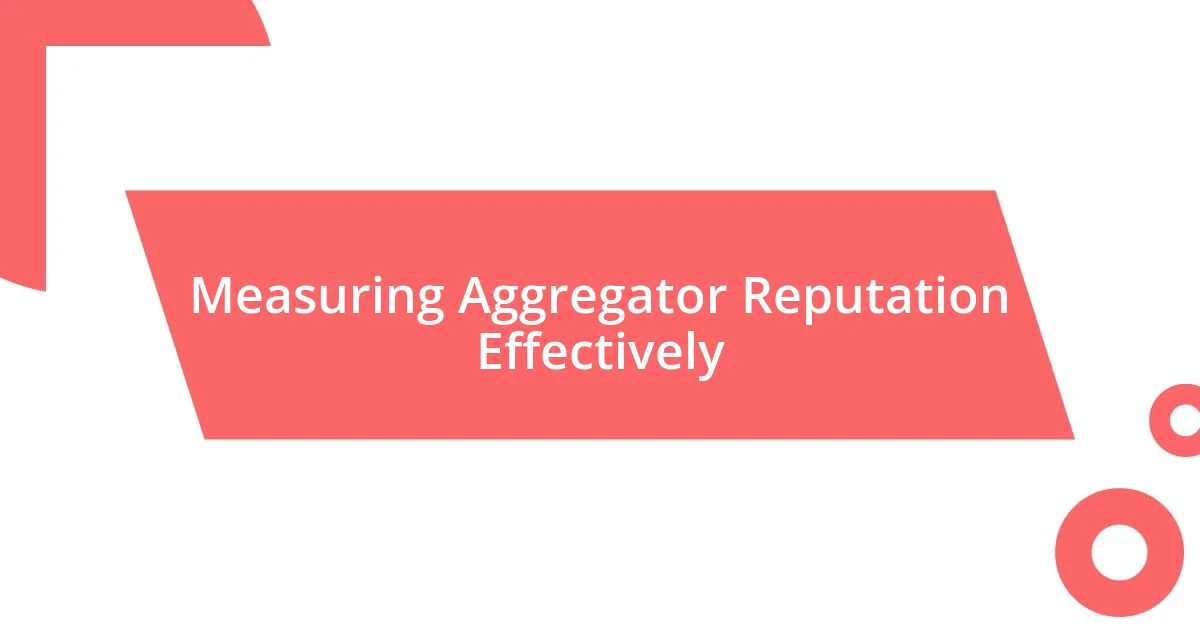
Measuring Aggregator Reputation Effectively
Measuring aggregator reputation effectively hinges on the analysis of diverse data points, with user feedback being paramount. Recently, I was exploring an online accommodation platform and stumbled upon a single star rating among many five-star reviews. That one negative rating stood out starkly to me, making me wonder: how do aggregators weigh these discrepancies? Understanding the balance of positive and negative feedback is crucial in gauging overall reputation.
Another vital aspect is tracking how engagement metrics, like response times and customer interactions, influence perception. I remember a situation where I reached out to an aggregator regarding a flawed recommendation. Their swift and thoughtful reply not only resolved my issue but also reinforced my belief in their commitment to customers. This experience made me think: isn’t it fascinating how a timely response can elevate a company’s standing in an instant?
Lastly, aggregators benefit from monitoring their reputation across various platforms, as it provides a comprehensive view of public sentiment. I often check aggregators’ social media pages, noticing how their responses to comments or concerns shape my opinion. It’s compelling to see a platform take the time to engage with its users, making me feel valued. Doesn’t it seem like fostering a multi-channel dialogue only deepens the trust users have in the aggregator? This holistic approach to reputation measurement not only keeps customers informed but also builds a robust trust foundation.
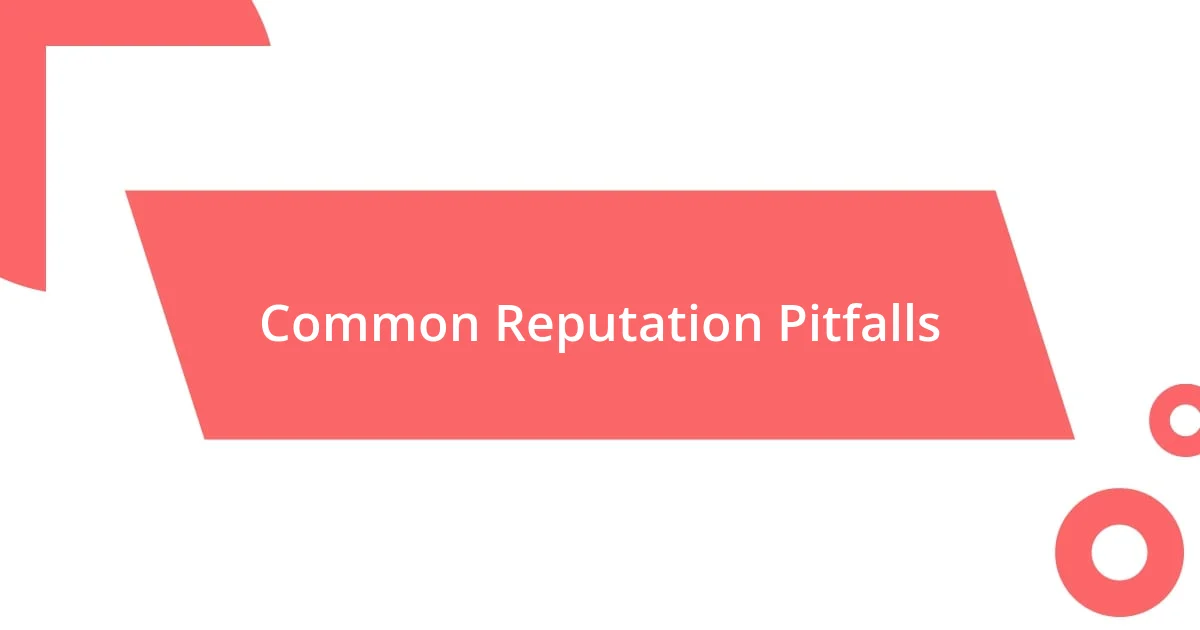
Common Reputation Pitfalls
Common Reputation Pitfalls can often catch even the most seasoned businesses off guard. One major pitfall I’ve observed is neglecting to address negative feedback promptly. I remember reading a review about a restaurant where the owner responded weeks later, appearing detached and uninterested. It left me wondering: what was stopping them from engaging in real-time? Ignoring criticism can not only amplify mistrust but also give potential customers the impression that the business is unresponsive.
Additionally, another mistake is the over-reliance on automated responses, especially on social media. I once interacted with an aggregator that seemed to value its algorithms more than genuine human connection. Their generic replies felt like a missed opportunity to build rapport. I found myself asking: how can a business convey its personality when everything feels robotic? Over time, this impersonal touch can isolate loyal customers, making them feel like just another number in the system.
And then there’s the issue of inconsistent messaging across platforms. I recall trying to follow a brand on Twitter after seeing a compelling advertisement on Instagram. To my surprise, the tone and offers were completely different. It made me feel confused and even a bit frustrated. What message were they really trying to convey? When a company’s voice doesn’t match across channels, it can fracture trust, diluting the reputation they’ve worked hard to build.
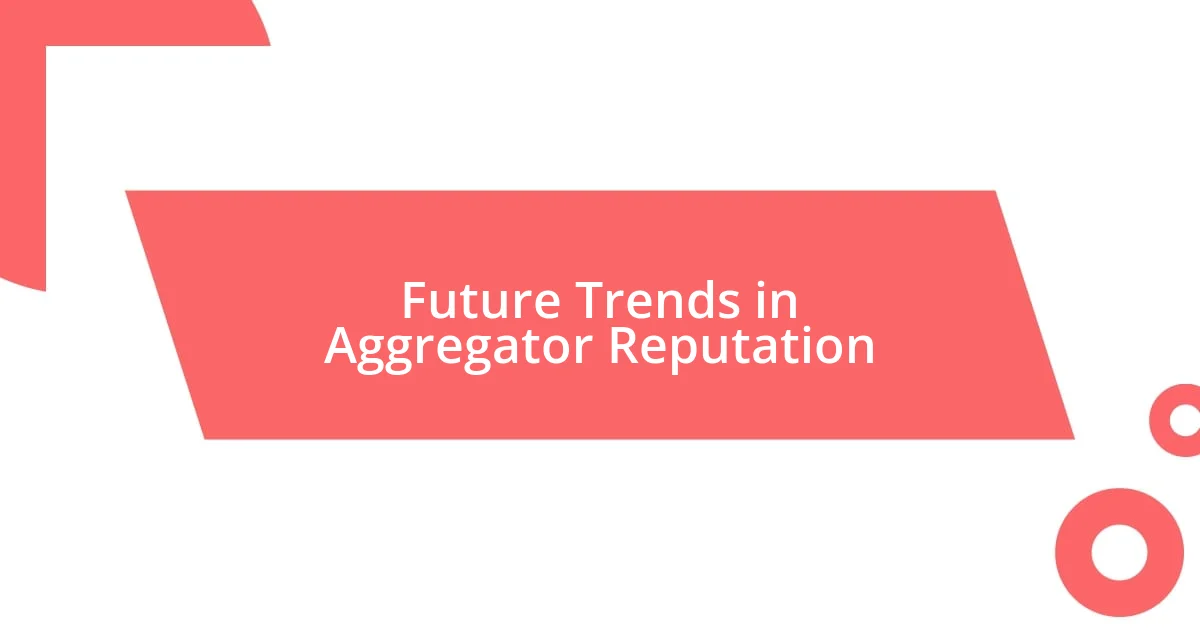
Future Trends in Aggregator Reputation
As we look ahead, I anticipate an increased emphasis on transparency in aggregator reputation management. I recall a time when I chose a service based on their clear, open policies regarding user feedback and dispute resolution. Their proactive approach made a lasting impression on me—don’t we all appreciate when companies are upfront about their practices? I believe this trend will not only foster greater trust but will also elevate the role of customer feedback in shaping aggregator policies.
Social listening is another avenue poised for growth when it comes to reputation monitoring. There was a recent instance where a brand I followed was praised and criticized on various forums, and their ability to pick up on those discussions made me realize how vital it is for them to stay engaged. Doesn’t it resonate that those who actively listen to their audience can better adapt and enrich their service offerings? Increasing reliance on sentiment analysis tools will allow aggregators to tap into real-time feedback, helping them navigate their reputation landscape more effectively.
I think we’ll also see a shift towards building communities around brands as a means to enhance reputation. I’ve fondly participated in several online groups where users share experiences and support one another. It’s empowering and made me more loyal to the brands involved. Isn’t it fascinating how cultivating a space for customers can not only enhance perception but also create a loyal follower base? This strategy could redefine how aggregators view their reputation: not just as a metric, but as a living, evolving relationship with their customers.















